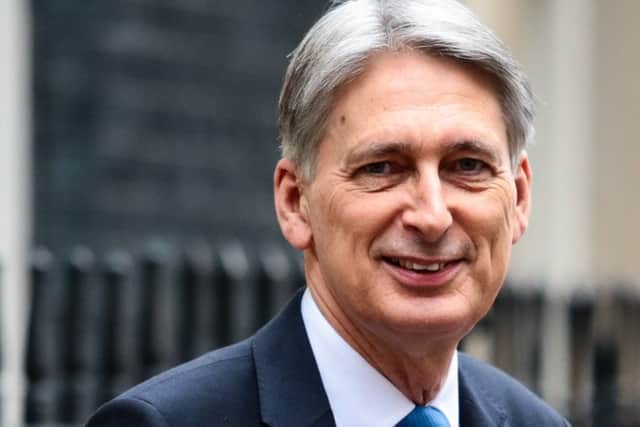Brian Monteith: Hammond's Budget removes justification for SNP tax rises
Two important questions that came out of Philip Hammond’s fairly pedestrian budget last week. The first is to ask, what is going on at the Office of Budget Responsibility (OBR) that it has so often to “correct” its forecasting and yet still be consistently wrong? The second is to establish if Scotland really is gaining £2bn of additional spending from Barnett Formula consequentials over the next five years?
Given the OBR’s downgrading of its forecasts for UK GDP one might have expected the Chancellor to respond by delivering a more radical “budget for growth”? That he didn’t suggests to me he probably does not believe the OBR himself, and who could blame him for that? Since its creation its record has been persistently poor.
Advertisement
Hide AdAdvertisement
Hide AdThe OBR now cites UK productivity as its justification for revising GDP growth down, but there is growing evidence that its methodology is wrong. For a start it fails to capture the huge productivity gains of the digital age at which the UK in particular is more advanced than many of its EU competitors. Smart Phones and their Apps, the Cloud, Uber, Airbnb, online retail developments – these and others changes to our lifestyles have increased productivity hugely but I am assured the benefits are not captured in the OBR statistics. It does, however, explain why higher than expected HMRC revenues have often surprised forecasters, because the unseen productivity gains feed through in economic growth and greater revenues.


Maybe Hammond does not have the temperament needed to reform our complex and burdensome tax system? If that is the case then someone with a more optimistic vision should be appointed to roll back the tax burden that has been growing for the last 20 years.
One day the Conservatives may at last recognise there is a golden opportunity to convert millions of voters to the cause of an open and liberal society by the wholesale simplification of our tax codes and decimating the plethora of incentives and disincentives. These often-contradictory rules encourage individual fecklessness and the misallocation of investment to unproductive uses – as well as promoting legal tax avoidance and illegal tax evasion that politicians claim to be fighting.
If you rejoice at Hammond’s abolition of Stamp Duty in England for first time buyers of properties under £300,000 then remember it is politicians who made that once simple tax far more complex and costly – which is why the new dispensation is needed in the first place. Far better, surely, to simplify for everyone a tax that many argue has contributed to the UK’s housing crisis.
It is no consolation that the SNP’s own Land and Buildings Transaction Tax has been an even greater failure, having delivered £54.4 million less than Derek Mackay predicted for 2016/17.


Following Hammond’s UK Budget all eyes in Scotland will be turning to the Scottish Government’s version to be announced by its Finance Secretary, Derek Mackay, on 14 December. It is on that day we shall establish just how the SNP will seek to justify an overall increase in taxes for working Scots. One clue is to look at the proposals of the SNP’s life support system, the six Green MSPs, who wish to see a 60p tax rate for those earning over £150,000 with a tax cut for the lowest earners.
To fund a new lower rate and maintain overall tax revenues at current levels would require upper rates to increase significantly, but to bring in even higher revenues would require altogether more substantial increases, especially if it encourages greater avoidance.
There are two dangers to such an approach; the first is the continual divergence between Scotland and England of upper rate tax (already started by the SNP freezing the indexation of the threshold at which the upper rate kicks in) will encourage those with skills and job-creating entrepreneurial flair to move south where the rewards are greater; while the second is that a sharper rise in the structure of tax rates dampens individual aspirations and ambitions at all levels of society, contributing to a culture of slower economic growth that Scotland desperately needs to break free from.
Advertisement
Hide AdAdvertisement
Hide AdThere is, however, another way. Having campaigned against them, the SNP has no mandate for higher taxes and could easily resist any political demands from the Greens, Labour and Liberal Democrats because a majority of MSPs in Holyrood – 63 SNP and 31 Conservatives – would command a majority to veto them. Now, thanks to Hammond’s Budget, there is also no economic necessity to raise taxes for the Scottish Parliament’s own researchers (SPICe) have confirmed the funds available to the Scottish Government in 2018/19 will rise, not fall, even if it is by only 0.1%.
That Nicola Sturgeon and her ministers continue to rubbish the additional £2 billion of spending coming their way, dismissing it as being “financial transactions”, when they use the same mechanism to finance their own spending initiatives (£347.5 million in the last year) illustrates this Scottish Government will go to any lengths to manufacture grievance-based justifications for tax rises. It’s not so much fake news as fake economics.
Any SNP government decision to forego the support of Tory MSPs to prevent tax increases it does not need to make can only be described as putting its own ideological dogma before the Scottish people.
That Mackay is likely to make Scotland even more heavily taxed than the rest of the UK when it is not necessary is an example of unparalleled economic recklessness that will take generations to repair the damage to jobs, public services and the fight against poverty.